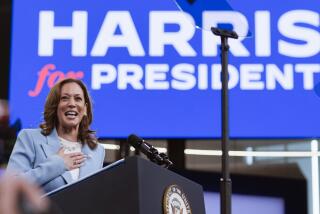Republican stalwarts just blocked the last big push to stop Donald Trumpâs nomination

Reporting from Cleveland â The last-ditch push to block Donald Trumpâs nomination for president fizzled late Thursday, swatted back by GOP officials anxious to unify the party and stop the renegade effort.
Members of the committee setting rules for next weekâs Republican National Convention in Cleveland decisively rejected the move to allow delegates to vote for anyone they want, rather than follow the results of the primary season. Instead, they passed a measure making clear that most delegatesâ votes are bound to primary and caucus results for at least one round of balloting, which would all but ensure Trump is nominated.
The outcome is not final but shows the herculean climb the anti-Trump faction faces in stopping his nomination. Republican leaders are desperate to avoid a potentially messy and high-profile showdown on the convention floor after a primary season that has already pushed the party to the brink.
âItâs over, folks. We need to get behind our candidate,â said Steve Scheffler, a committee member from Iowa.
But anti-Trump delegates argued their fundamental right to freely vote their conscience was being thwarted by party officials seeking order over democracy.
âThat is a God-given right. It should not be taken away by the RNC or by any party or by the state,â said Kendal Unruh, the champion of the proposed change.
Trumpâs team was clearly jubilant over the outcome on a day when it was the focus of frenzied speculation over Trumpâs running mate pick, and after having pushed the panel to continue meeting late into the night to resolve the issue.
âAnti-Trump people get crushed at Rules Committee. It was never in doubt: Convention will honor will of people & nominateâ Trump, campaign chairman Paul Manafort tweeted.
âWe do think itâs over,â added a person within Trumpâs operation, granted anonymity to discuss the proceedings. âWe hope this unifies the party.â
But conservative Sen. Mike Lee (R-Utah), a proponent for letting the delegates vote freely, warned that the committeeâs actions would not quell skepticism about Trump.
âThis angst isnât just going to go away because we paper over it with rules,â he said.
Lee is close with Texas Sen. Ted Cruz, the last serious challenger to Trumpâs march to the nomination. Cruz supporters, determined to stop Trump from winning the nomination, had worked the arcane delegate selection process for months but fell short when the senator exited the race in May.
A loose band of delegates, led by Unruh, rallied to try to derail the nomination of Trump, whose unconventional candidacy they see as out of touch with conservative values and even, to some, as a threat to the country.
But the majority of rules committee members saw the support for Trump as the true movement to be heeded, said Steve Munisteri, a committee member from Texas.
âYou want to ignore what is really the grass roots, which is millions of millions voters that voted for Donald Trump?â he said to Lee. âIf weâre really representative of the grass roots, and weâre really representative conservatism, we listen to those voices.â
Unruhâs proposed change was never expected to win a majority of votes on the committee, which skews heavily toward party loyalists. But anti-Trump forces had hoped to notch support from at least a quarter of the 112-person panel, an outcome of enough significance to force all 2,472 delegates at next weekâs convention to decide what rules would govern the nominating process.
There was no roll call on Unruhâs proposal, so it was unclear exactly how many supporters she had, but it appeared to far fall short of the threshold of 28 votes needed.
The bureaucratic challenge was just one way the anti-Trump faction seeks to influence the convention proceedings as delegates gather in Cleveland.
Some merely interpret current rules as already leaving delegates free to vote for the candidate of their choice. Another effort encourages delegates to stay off the convention floor for the initial votes. They would then return for later rounds of balloting under which an increasing number of delegates are plainly free to vote as they choose.
But all of these plans face steep odds against a Republican Party apparatus aligned with Trump, and delegates who are wary of essentially invalidating the results of the primary season or weakening the GOPâs general election chances against presumed Democratic nominee Hillary Clinton.
Committee members toiled late into the night Thursday to consider a raft of changes to the rules governing how the Republican Party operates and nominates its presidential candidate.
Proceedings got off to an inauspicious start: a four-hour delay that was initially blamed on a faulty printer.
In fact, Trump operatives and party officials were working behind the scenes to stave off a rebellion from a conservative faction of committee members, who sought a number of amendments to shift power from GOP leadership to the grass roots.
Most of the changes proposed by the insurgency, led by former Virginia Atty. Gen. Ken Cuccinelli, came up well short. In one vote, the committee decisively rejected an effort to ban lobbyists from serving as RNC members.
But the bloc flexed some muscles in its push to encourage states to adopt closed primaries, in which only Republicans are allowed to vote. Conservative activists have blanched at open contests that allow independent voters or even Democrats, arguing GOP voters should pick their partyâs candidate.
The majority of the committee rejected that plan, but more than 30 members were on board, indicating that the fight could go before the full convention next week.
Twitter: @melmason, @lisamascaro
ALSO
âNever Trumpâ forces converge on Cleveland for last stand over partyâs nomination
The broken printer that wasnât: The Republican rules meeting kicks off with a bit of intrigue
With âfree the delegatesâ rallying cry, upstarts seek to block Trump nomination in Cleveland
More to Read
Sign up for Essential California
The most important California stories and recommendations in your inbox every morning.
You may occasionally receive promotional content from the Los Angeles Times.












